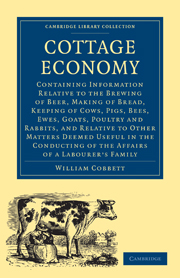Book contents
- Frontmatter
- Contents
- 1 Introduction. To the Labouring Classes of this Kingdom.—Brewing Beer
- 2 Brewing Beer continued
- 3 Making Bread
- 4 Making Bread continued.—Brewing Beer.—Keeping Cows
- 5 Keeping Cows
- 6 Keeping Pigs.—Salting Mutton and Beef
- 7 Bees, Geese, Ducks, Turkeys, Fowls, Pigeons, Rabbits, Goats and Ewes, Candles and Rushes, Mustard. Dress and Household Goods and Fuel, Hops and Yeast
- INDEX
6 - Keeping Pigs.—Salting Mutton and Beef
Published online by Cambridge University Press: 29 August 2010
- Frontmatter
- Contents
- 1 Introduction. To the Labouring Classes of this Kingdom.—Brewing Beer
- 2 Brewing Beer continued
- 3 Making Bread
- 4 Making Bread continued.—Brewing Beer.—Keeping Cows
- 5 Keeping Cows
- 6 Keeping Pigs.—Salting Mutton and Beef
- 7 Bees, Geese, Ducks, Turkeys, Fowls, Pigeons, Rabbits, Goats and Ewes, Candles and Rushes, Mustard. Dress and Household Goods and Fuel, Hops and Yeast
- INDEX
Summary
143. AS in the case of cows so in that of pigs, much must depend upon the situation of the cottage; because all pigs will graze; and, therefore, on the skirts of forests or commons, a couple or three pigs may be kept, if the family be considerable; and especially if the cottager brew his own beer, which will give him grains to assist the wash. Even in lanes, or on the sides of great roads, a pig will find a good part of his food from May to November; and, if he be yoked, the occupiers of the neighbourhood must be churlish and brutish indeed, if they give the owner any annoyance.
144. Let me break off here for a moment to point out to my readers the truly excellent conduct of Lord Winchelsea and Lord Stanhope, who, as I read, have taken great pains to make the labourers on their estates comfortable by alloting to each a piece of ground sufficient for the keeping of a cow. I once proposed to the copy-holders and other farmers in my neighbourhood, that we should petition the Bishop of Winchester, who was Lord of the Manors thereabouts, to grant titles to all the numerous persons called trespassers on the wastes; and also to give titles to others of the poor parishioners, who were willing to make on the skirts of the wastes, enclosures not exceeding an acre each. This, I am convinced would have done a great deal towards relieving the parishes then greatly burdened by men out of work.
- Type
- Chapter
- Information
- Cottage Economy , pp. 121 - 142Publisher: Cambridge University PressPrint publication year: 2009First published in: 1822

